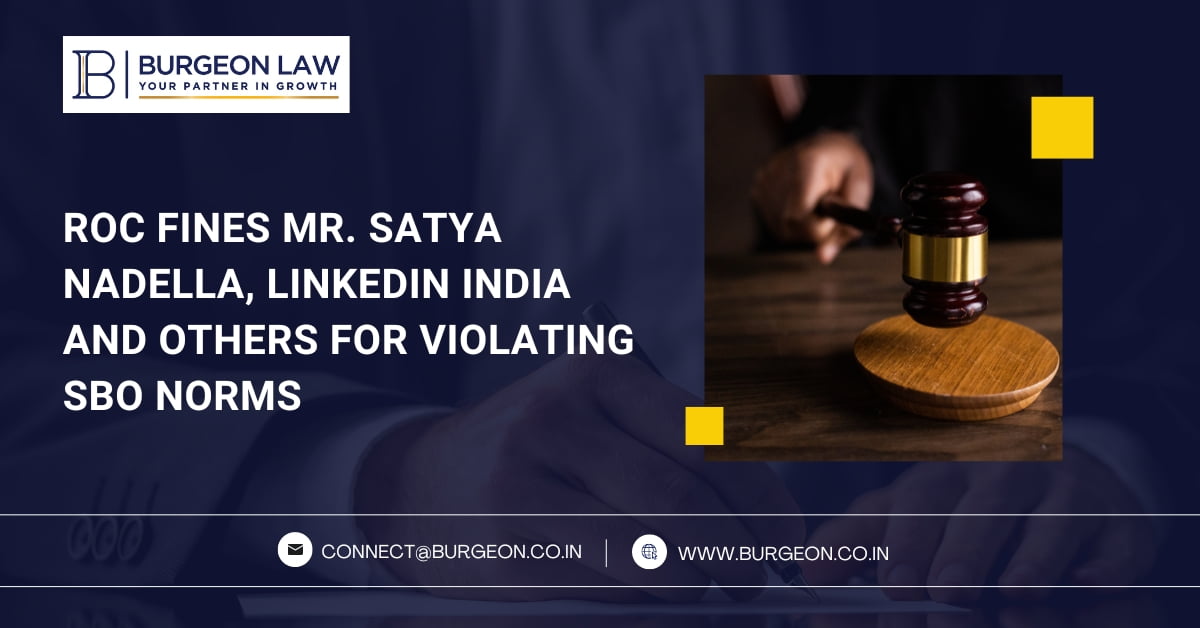By way of its order dated May 22, 2024, the Registrar of Companies (“RoC”) has imposed a penalty on Microsoft Chief Satya Nadella and eight other executives for an amount of approximately INR 28 lacs on account of violating requirements related to beneficial interest and significant beneficial ownership under the Companies Act, 2013 (“Act”) in relation to Linkedin Technology Information Private Limited (“Linkedin India”).
Beneficial Interest:
Section 89 of the Act stipulates that where legal and beneficial owners of shares are different, the legal and beneficial owners are required to file declarations in prescribed form to the concerned company, which upon receipt of such declarations is further required to undertake filing of e-form MGT-6 with the RoC.
In the instant case, Linkedin India had filed e-form MGT-6 stating LinkedIn Technology Unlimited Company (“Linkedin Technology”) as the registered holder and LinkedIn Ireland Unlimited Company (“Linkedin Ireland”) as the beneficial owner of one share, with the date of creation of beneficial interest as January 11, 2024. However, upon reviewing the annual financial statements of Linkedin India, the RoC concluded that the beneficial interest had arisen much prior to the said date disclosed to the RoC.
While Linkedin India contented that the beneficial ownership had always vested with Linkedin Ireland, and that they had erred in the filing by mentioning the incorrect date from which the beneficial ownership was created, the RoC rejected their averments and concluded that both Linkedin Technology and Linkedin Ireland had violated Section 89 of the Act.
Significant Beneficial Ownership:
Section 90 of the Act requires companies to identify all individuals who are its ‘significant beneficial owners’, post which such identified individuals are required to file a declaration with the company in prescribed form. The company is further required to file a return with the RoC. The ‘significant beneficial owner’ is required to be ascertained through the prescribed tests of shareholding, voting, dividend rights or exercise of significant influence or control.
In this regard, Linkedin India contended that: (a) there is no individual who is a shareholder of Linkedin India; and (b) the ultimate holding company is Microsoft Corporation, USA, a listed body corporate, where it is publicly reported that no individual holds a majority stake.
The RoC, after examining the beneficial ownership of Linkedin India, through its holding and subsidiary relationships, reporting made on their websites and the manner in which financial control was exercised, concluded that inter alia Mr. Satya Nadella and Mr. Ryan Roslansky were significant beneficial owners due to their ability to control Linkedin India, as indicated by their positions within Linkedin Corporation, USA and Microsoft Corporation, USA.
Key Takeaways:
While Linkedin India has stated that is examining the Order and we expect an appeal to be filed post that, the Order signifies the importance that the Government is placing on identification of beneficial owners in companies. It therefore becomes critical for companies, especially startups, to ensure that they correctly ascertain their corporate structures and undertake timely and correct reporting under Sections 89 and 90 of the Act.
Author: Ankit Bhasin

